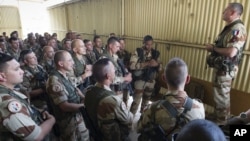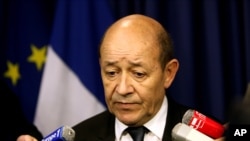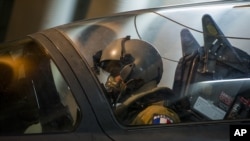PARIS —
French troops sustained their first losses, after launching a military offensive against Islamist radicals in Mali and a failed hostage rescue attempt in Somalia. Both developments represent a new, more muscular reaction by the French government to the Islamist threat in Africa.
In less than 24 hours, France has launched two offensives against Islamists in East and West Africa, and sustained its first casualties. At a news conference in Paris Saturday, Defense Minister Jean-Yves Le Drian announced the death of a French helicopter pilot during an operation against Islamist insurgents in southern Mali.
Le Drian defended France's military action in Mali, saying that a terrorist offensive in the West African country threatens the security not only of the region, but also of Europe. Like President Francois Hollande, who announced the intervention on Friday, he said the operation would last as long as necessary.
Le Drian said the intervention came at the request of the Bamako government and other African states, following intelligence reports that three Islamist groups were preparing a major offensive in southern Mali. Besides beating back the Islamists, he said France also aims to secure Mali's stability and protect the lives of French and European nationals there.
Le Drian also said one French soldier was killed killed and another was missing in a separate military operation in Somalia - an unsuccessful attempt to rescue a French national held hostage there for more than three years. The defense minister reported 17 Islamists were killed, and he said the hostage also died. In Somalia, however, al-Shabab insurgents said the hostage is still alive and in their custody.
Le Drian said the two operations were not directly linked, but that the Islamist advance in Mali reinforced the power of other radical groups holding hostages in Africa.
The French offensive marks a reversal in Hollande's initial policy of supporting Bamako in training and logistics, but not intervening militarily in its former colony.
In an interview with France 24 television, a member of the Malian radical group Ansar Dine threatened reprisals against France.
But the government's strong action in Africa has drawn support across the political spectrum. In a Twitter note, British Foreign Secretary William Hague praised the move, as did former Senegalese Minister and think-thank head Cheik Tidiane Gadio. Gadio told RFI radio that France is not acting like a former colonial power, but as a defender of human rights in a country where terrorists are taking over.
Hollande's predecessor as president, Nicolas Sarkozy, also intervened militarily in West Africa, carrying out airstrikes in Ivory Coast in 2011 that helped end a longstanding conflict there.
In less than 24 hours, France has launched two offensives against Islamists in East and West Africa, and sustained its first casualties. At a news conference in Paris Saturday, Defense Minister Jean-Yves Le Drian announced the death of a French helicopter pilot during an operation against Islamist insurgents in southern Mali.
Le Drian defended France's military action in Mali, saying that a terrorist offensive in the West African country threatens the security not only of the region, but also of Europe. Like President Francois Hollande, who announced the intervention on Friday, he said the operation would last as long as necessary.
Le Drian said the intervention came at the request of the Bamako government and other African states, following intelligence reports that three Islamist groups were preparing a major offensive in southern Mali. Besides beating back the Islamists, he said France also aims to secure Mali's stability and protect the lives of French and European nationals there.
Le Drian also said one French soldier was killed killed and another was missing in a separate military operation in Somalia - an unsuccessful attempt to rescue a French national held hostage there for more than three years. The defense minister reported 17 Islamists were killed, and he said the hostage also died. In Somalia, however, al-Shabab insurgents said the hostage is still alive and in their custody.
Le Drian said the two operations were not directly linked, but that the Islamist advance in Mali reinforced the power of other radical groups holding hostages in Africa.
The French offensive marks a reversal in Hollande's initial policy of supporting Bamako in training and logistics, but not intervening militarily in its former colony.
In an interview with France 24 television, a member of the Malian radical group Ansar Dine threatened reprisals against France.
But the government's strong action in Africa has drawn support across the political spectrum. In a Twitter note, British Foreign Secretary William Hague praised the move, as did former Senegalese Minister and think-thank head Cheik Tidiane Gadio. Gadio told RFI radio that France is not acting like a former colonial power, but as a defender of human rights in a country where terrorists are taking over.
Hollande's predecessor as president, Nicolas Sarkozy, also intervened militarily in West Africa, carrying out airstrikes in Ivory Coast in 2011 that helped end a longstanding conflict there.


